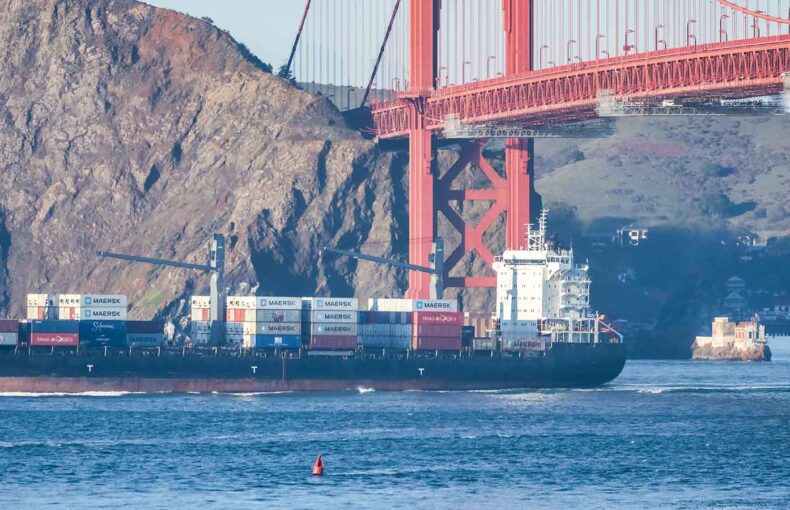Defining effective maritime routes beyond simple navigation
In today’s maritime environment, where fuel costs are high, regulations are stringent, and global maritime security is unpredictable, effective routing has become essential to ensure sustainable operations.
Without a robust routing solution, maritime operators face a host of challenges: vessels may take inefficient maritime routes, leading to increased fuel consumption and higher emissions, or get caught in severe weather, risking safety and causing costly delays. Port congestion, left unaddressed, can turn a minor delay into a significant disruption, impacting the entire supply chain and potentially disrupting maritime trade routes.
Maritime shipping routes aren’t always as straightforward as from point A to B
In maritime operations, vessels don’t always follow a straightforward path from point A to B. Shipping routes must account for a wide range of variables, including compliance regulations, port conditions, geopolitical events, and potential piracy activity. Even with a well-planned route, unexpected factors, such as sudden changes in cargo destinations or emerging security risks, can rapidly alter conditions. Continuously updating routes as new information becomes available is essential to maintaining efficiency, safety, and cost-effectiveness. This dynamic approach to routing helps vessels avoid delays, minimize fuel consumption, and stay on schedule, even in unpredictable environments.
A data-driven approach to maritime routing
To address these challenges, a routing solution provides a data-driven approach to maritime logistics, helping vessels optimize fuel usage, and adapt to real-time changes in port and traffic conditions. By focusing on efficiency, safety, and compliance, routing solutions empower maritime operators to align with today’s operational demands.
Modern routing solutions continuously process real-time inputs, such as sea conditions, port congestion updates, and navigational constraints, enabling operators to make adaptive decisions throughout a voyage. By reducing the need for manual intervention, routing systems improve decision-making efficiency and reduce the risk of human error.
Optimizing fuel and ensuring regulatory compliance
One of the most significant benefits of routing is fuel optimization. Fuel costs make up a substantial portion of operational expenses for maritime companies, and efficient routing can significantly reduce these costs. Routing solutions allow companies to track and analyze fleet performance, identify areas for improvement, and enhance overall operational efficiency. By calculating routes that balance efficiency and safety, routing helps reduce fuel consumption and lower emissions, contributing to environmental sustainability while avoiding high-risk zones or other operational challenges. Routing also enables ship owners and operators to predict and achieve Carbon Intensity Indicator (CII) targets, supporting compliance with IMO emission regulations and ensuring that each voyage aligns with annual sustainability objectives.
Additionally, routing solutions such as Spire Maritime’s Routing API factor in Emission Control Areas (ECA) and Sulphur Emission Control Areas (SECA), where vessels must meet strict environmental guidelines, as well as high-risk zones like piracy-prone areas and other areas with navigational constraints. This enables maritime companies and solution providers to maintain regulatory compliance and avoid penalties by adhering to rigorous environmental standards in controlled zones.
Enhancing supply chain efficiency and visibility
Furthermore, routing solutions play a critical role in optimizing supply chains by enabling precise planning and coordination across complex shipping routes. Solution providers and freight forwarders can integrate routing data through APIs, allowing them to plan and visualize the transport of specific shipments that often require multiport and multivessel routes. By incorporating routing into their applications, they can better manage shipment schedules, reduce transit times, and improve the predictability of arrival dates. Routing solutions also provide valuable insights for chartering, helping stakeholders identify the most cost-effective vessels and routes, minimize idle time, and improve fleet utilization. Additionally, insights from routing data assist operators in allocating vessels within a fleet more effectively, ensuring optimal use and cost efficiency. This level of optimization not only enhances efficiency but also allows companies to respond dynamically to disruptions, ensuring a smoother flow of goods across the supply chain. These capabilities also extend to global logistics networks, where multiport and multivessel operations depend on synchronization. Routing’s ability to manage complexity ensures that stakeholders can streamline transshipments, avoid bottlenecks, and optimize vessel routes across interconnected supply chains.
Incorporating routing data
Integrating a Routing API with existing maritime software allows solution providers to deliver enhanced functionality and value for their customers. By incorporating routing data directly into their platforms, providers enable users to visualize vessel routes, track progress in real-time, and gain more accurate estimates of arrival times at ports. This added capability is particularly valuable for stakeholders needing precise scheduling information, as it helps them plan for arrivals, optimize port operations, and manage resources more effectively. With seamless integration, maritime companies can elevate their existing software, offering a more comprehensive solution that meets the growing demand for visibility and predictability in maritime logistics.
In an era where maritime logistics demands precision, agility, and sustainability, adopting a data-driven routing approach isn’t just beneficial, it’s transformative for the future of shipping.
Contact us for more information on route planning, supply chain and chartering optimization, and regulatory compliance using our various AIS data solutions, including Spire’s Routing API.
 Written by
Written by


